This Is What Kirsten Gillibrand's Platform Is Expected to Look Like
Running for president was no overnight decision for Gillibrand, who has spent the years since Trump's election establishing herself as a woman at the forefront of the resistance.
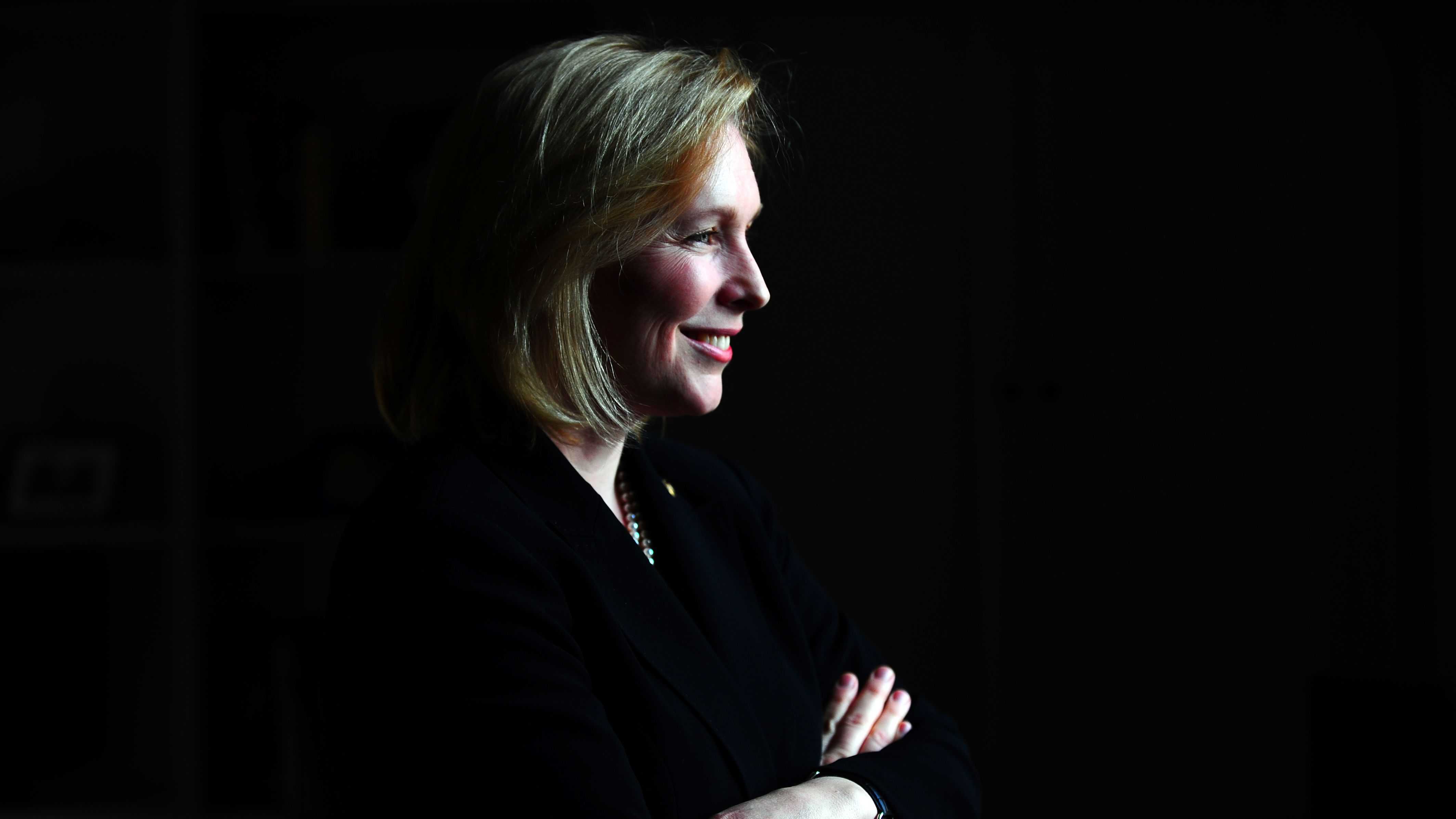

On Tuesday night, after months of speculation, Senator Kirsten Gillibrand announced on The Late Show With Stephen Colbert that, yes, she's running for president. The announcement came hand-in-hand with the news that Gillibrand, like other Democratic stars such as Elizabeth Warren and Kamala Harris, had formed a presidential exploratory committee—but Gillibrand went further than her peers, telling Colbert outright: "I’m going to run for president of the United States."
It's early days, but this was no overnight decision for the longtime senator, who has spent the years since Trump's election establishing herself as a woman at the forefront of the resistance. Indeed, Gillibrand was considered a potential Democratic frontrunner in 2016, but chose not to throw her hat in the ring—"I will consider it someday, I’m sure, but not any time in the near future," she told TIME in 2014, adding, "Hillary Clinton will be our first woman president"—and will likely argue on the campaign trail that she was motivated to run after seeing the political disarray at play during the Trump era.
Make no mistake, Gillibrand is a D.C. veteran who knows exactly what she's doing. Here's what we know about her 2020 platform so far—and what we can guess at from her extensive congressional record.
She'll make women's rights a cornerstone of her platform.
Gillibrand won't be alone on this—you can expect every one of the Democratic candidates for president to argue that President Trump is bad for women—but Gillibrand has earned her feminist credentials. Back in her attorney days in the '90s, Gillibrand defended abused and marginalized women, chaired the DNC's Women's Leadership Forum (and, later, the Senate Women's Caucus), and sought to mentor and elevate other women in her field.
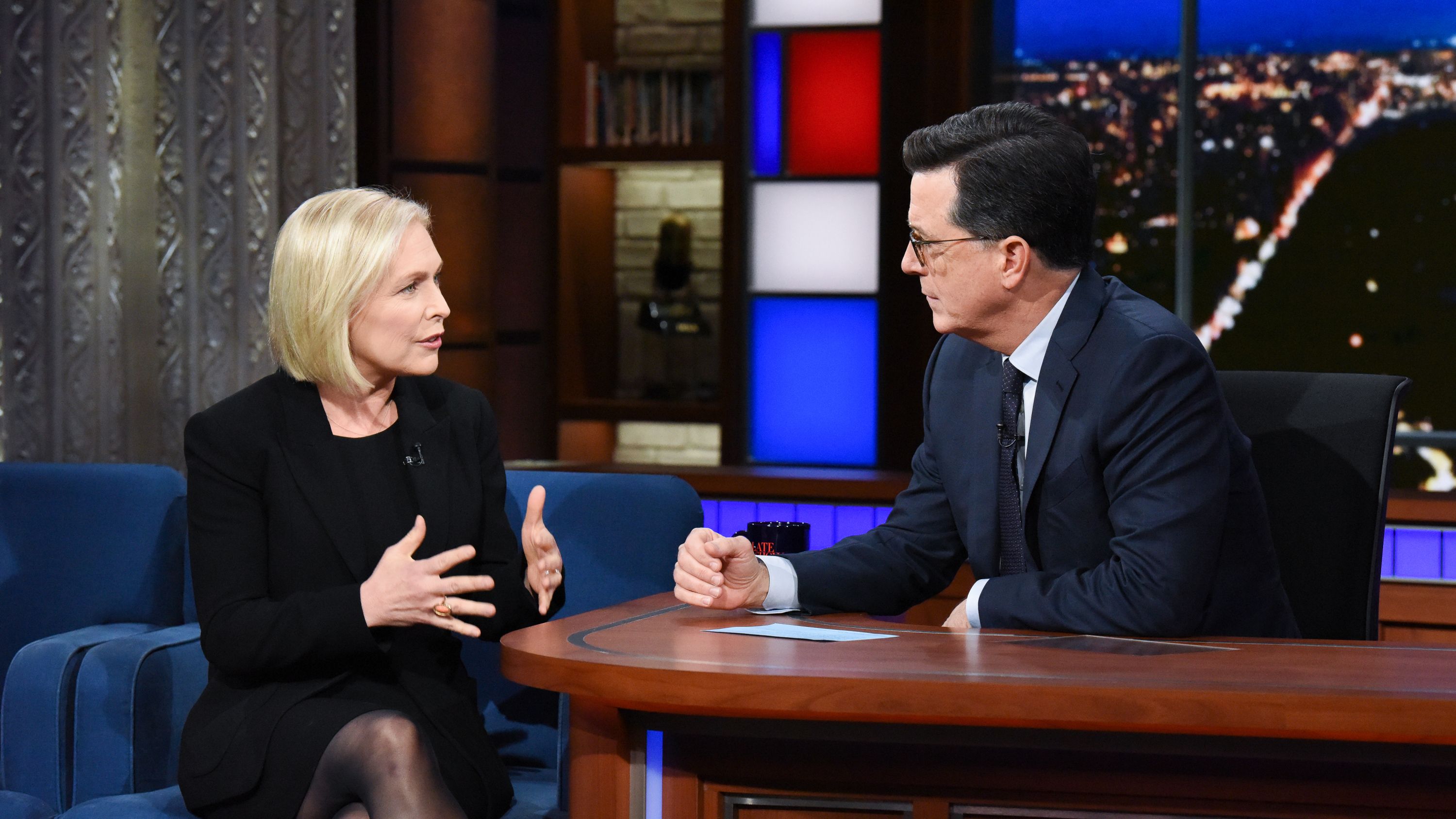
Gillibrand with Stephen Colbert.
Over the past decade, Gillibrand has positioned herself as an advocate for victims of sexual assault, with a particular focus on military sexual assault, and even brought activist Emma Sulkowicz to the State of the Union in 2015 in an act of solidarity. In recent years, she's tweeted about intersectional feminism, defended Planned Parenthood from an onslaught of conservative attacks, written a children's book about female heroes, and publicly described a Trump tweet about her as a "sexist smear" (it was). To Colbert, she invoked her status as a mother to two children: "As a young mom, I am going to fight for other people’s kids as hard as I would fight for my own."
She's also expected to highlight paid family leave during her campaign, arguing that the U.S. must catch up to the rest of the developed world in terms of offering paid leave to new parents and employees with sick family members. She's tried to push through a universal program to this end in Congress every year for the past five years, with no success.
She'll push for universal health care.
On the very first day of the campaign, in upstate New York, Gillibrand stated plainly that she'll fight the D.C. gridlock to push for universal health care. "If you want health care as a right and not a privilege, you have to be able to take on corruption in Washington," she said. "You have to be able to take on the special interests."
Get exclusive access to fashion and beauty trends, hot-off-the-press celebrity news, and more.
That "special interests" inclusion is a nod to how candidate Kristen Gillibrand will likely speak often about pulling money from politics. She'll also fight for a Medicare-for-all platform, having stridently backed Bernie Sanders' 2017 bill to create a single-payer, federally run health care system in the U.S. These things won't be independent to Gillibrand, however—most Democratic candidates in 2020 will seek some kind of single-payer federal health reform.
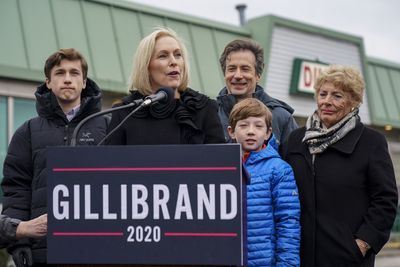
Gillibrand announcing her presidential run alongside her family.
What may be more unique to Gillibrand is the connection she's expected to make between her feminist values and her health care priorities, arguing that child care must be affordable and accessible and that maternal mortality rates in the U.S., which are particularly high among women of color, must be brought down at any cost. She'll also likely appeal to families by promising them the right to take care of their loved ones with the help of a paid leave plan from their employer.
She'll position herself as a fighter for the marginalized.
Gillibrand will likely lean on her record both in Congress and in her former life as an attorney as an advocate for women and victims of sexual harassment, assault, abuse, and discrimination. She was instrumental in getting ex-Democratic Senator Al Franken out of Congress when photos emerged of him groping a woman while she slept, and, tellingly, Gillibrand implied that Bill Clinton's legacy was tainted—a controversial move for a Democrat and a former mentee of Hillary Clinton's—when she said that Bill Clinton should have stepped down following the Monica Lewinsky scandal. In other words, Gillibrand has forcefully and deliberately tried to make clear that her advocacy for victims of sexual assault trumps her political affiliations.
RELATED STORY
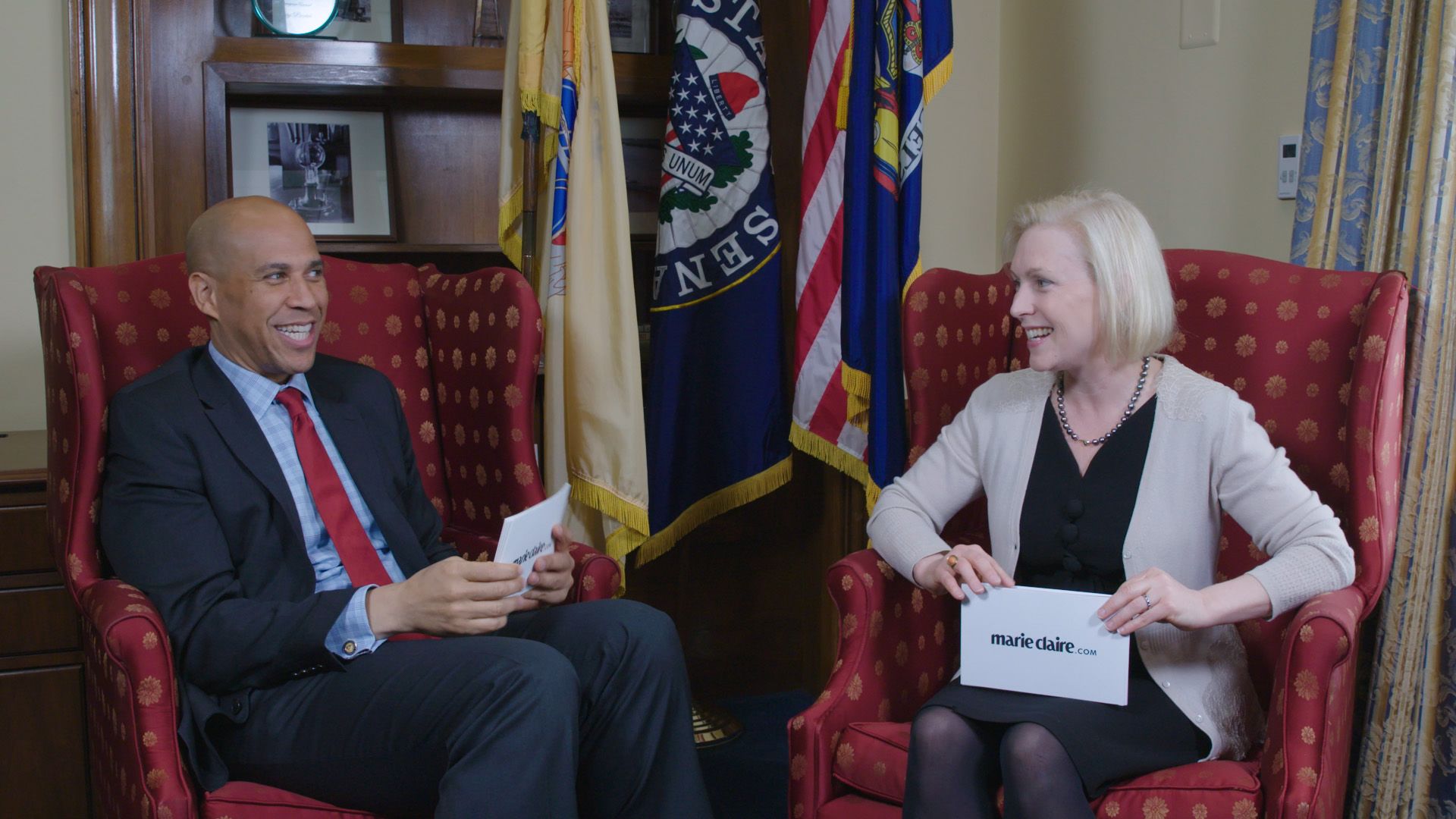
Politically, Gillibrand has long seen herself as an advocate for victims of sexual harassment of abuse. "For years she has been battling against sexual assault in the military and on campus, and talking about sexual harassment in politics, and now at last it seems as if the rest of the world has caught up to her concerns," wrote David Freedlander in Politico in 2017.
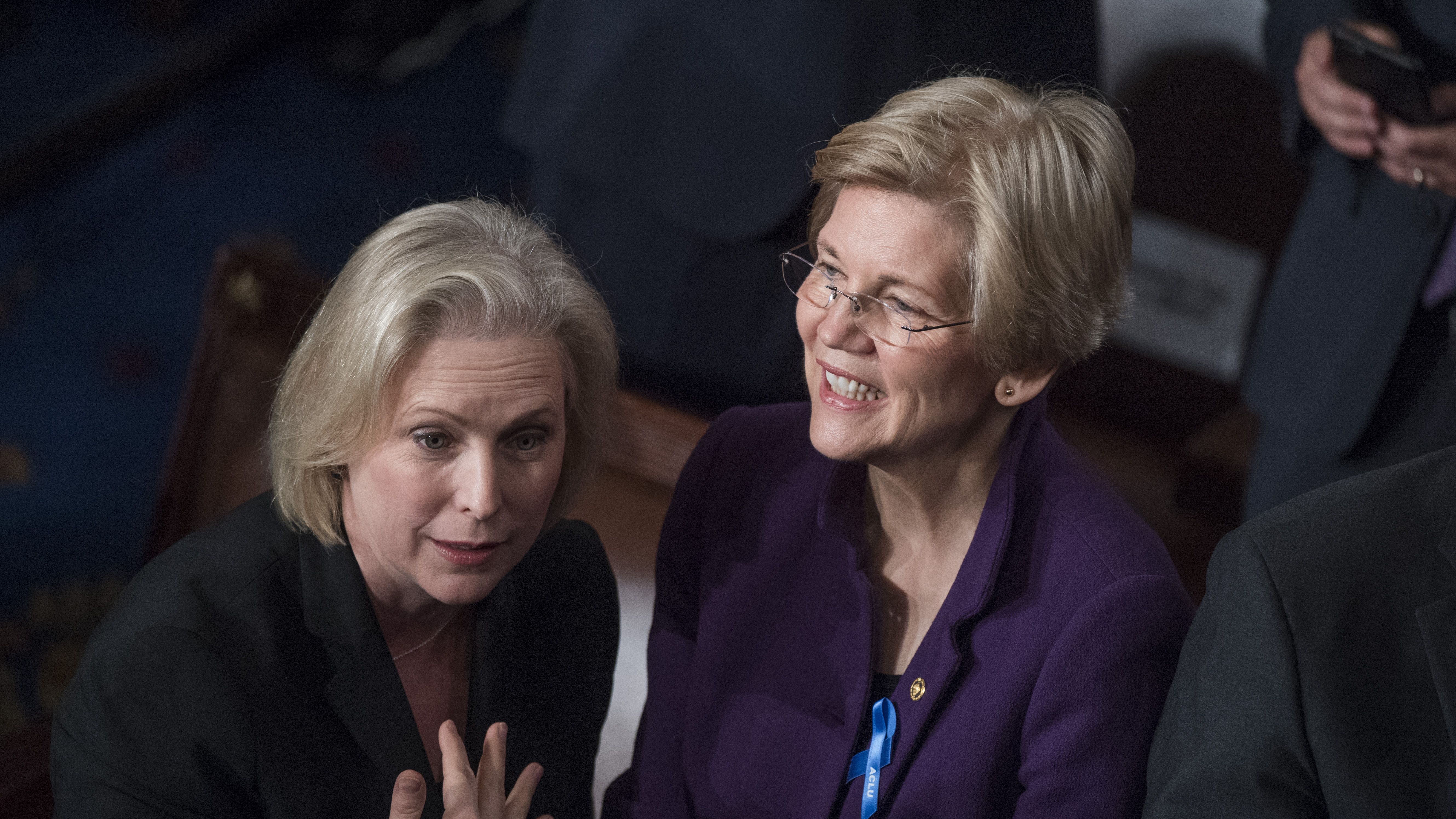
Gillibrand with expected Democratic opponent Elizabeth Warren in 2017.
Gillibrand was also the arbiter of a 2013 bill designed to protect sexual assault victims in the military, and has doubled down on her efforts to reform the military by helping bring down Don't Ask, Don't Tell (although, notably, she remained silent on the issue before joining the Senate, which you can expect critics to lambast her for).
And then there's Trump.
And, of course, Gillibrand will speak out against President Trump—a theme she kicked off during her interview with Colbert when she began speaking about the government shutdown. "He shouldn’t be having a temper tantrum because he can’t get what he wants," she told Colbert. This suggestion—that Trump has the disposition of a small child, and should not be trusted with, gosh, I don't know, the nuclear football—will no doubt endure throughout her campaign.
This post will be updated as Gillibrand continues her campaign.
For more stories like this, including celebrity news, beauty and fashion advice, savvy political commentary, and fascinating features, sign up for the Marie Claire newsletter.
RELATED STORY
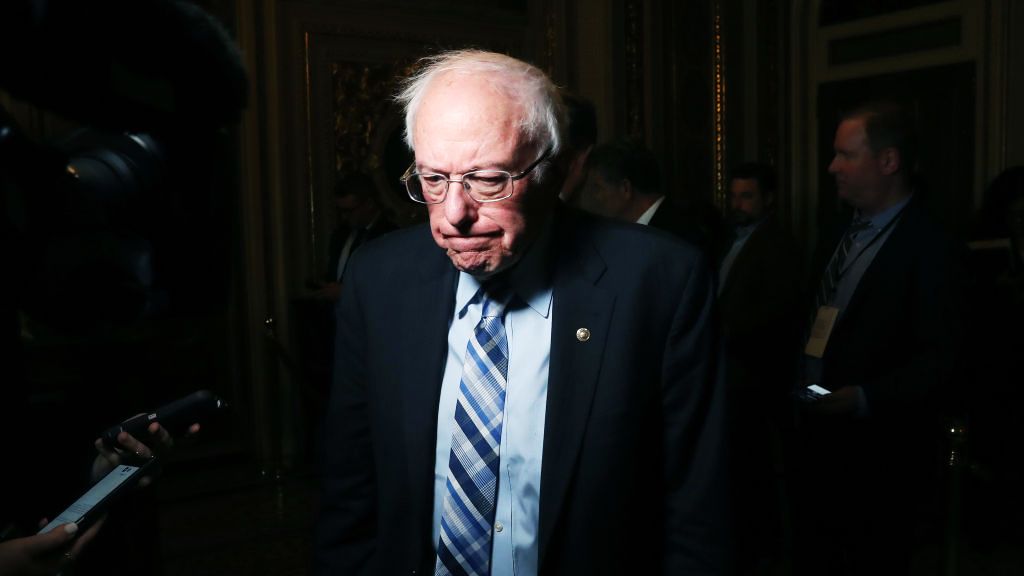

Jenny is the Digital Director at Marie Claire. A graduate of Leeds University, and a native of London, she moved to New York in 2012 to attend the Columbia University Graduate School of Journalism. She was the first intern at Bustle when it launched in 2013 and spent five years building out its news and politics department. In 2018 she joined Marie Claire, where she held the roles of Deputy Digital Editor and Director of Content Strategy before becoming Digital Director. Working closely with Marie Claire's exceptional editorial, audience, commercial, and e-commerce teams, Jenny oversees the brand's digital arm, with an emphasis on driving readership. When she isn't editing or knee-deep in Google Analytics, you can find Jenny writing about television, celebrities, her lifelong hate of umbrellas, or (most likely) her dog, Captain. In her spare time, she writes fiction: her first novel, the thriller EVERYONE WHO CAN FORGIVE ME IS DEAD, was published with Minotaur Books (UK) and Little, Brown (US) in February 2024 and became a USA Today bestseller. She has also written extensively about developmental coordination disorder, or dyspraxia, which she was diagnosed with when she was nine.